|
|
|
Sort Order |
|
|
|
Items / Page
|
|
|
|
|
|
|
| Srl | Item |
| 1 |
ID:
095613
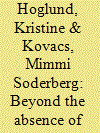

|
|
|
|
|
| Publication |
2010.
|
| Summary/Abstract |
This article introduces a novel way of conceptualising variations of peace in post-war societies. The most common way of defining peace in the academic literature on war termination is to differentiate between those cases where there is a continuation or resumption of large-scale violence and those cases where violence has been terminated and peace, defined by the absence of war, has been established. Yet, a closer look at a number of countries where a peace agreement has been signed and peace is considered to prevail reveals a much more diverse picture. Beyond the absence of war, there are striking differences in terms of the character of peace that has followed. This article revisits the classical debates on peace and the notion of the Conflict Triangle as a useful theoretical construction for the study of armed conflicts. We develop a classification captured in a Peace Triangle, where post-settlement societies are categorised on the basis of three key dimensions: issues, behaviour, and attitudes. On the basis of such a differentiation, we illustrate the great diversity of peace beyond the absence of war in a number of post-settlement societies. Finally, we discuss the relationship between the different elements of the Peace Triangle, and the challenges they pose for establishing a sustainable peace, as well as the implications of this study for policy makers concerned with peacebuilding efforts.
|
|
|
|
|
|
|
|
|
|
|
|
|
|
|
|
| 2 |
ID:
110238
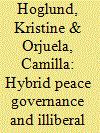

|
|
|
|
|
| Publication |
2012.
|
| Summary/Abstract |
This article analyzes hybrid peace governance and illiberal peacebuilding in postwar Sri Lanka. While discussing the kind of hybridity that has emerged, it focuses specifically on the international/domestic nexus by exploring the interplay between international intervention and domestic politics of peace governance and public mobilization. The analysis demonstrates that there are social and political divides that support the hybrid structures of peace governance. These are not merely between local and international actors; but there is also a sharp division within the international community. In this way, illiberal international powers have been gaining influence and have contributed to shaping the situation domestically. Illiberal politics are particularly justified through mobilization against the liberal peacebuilding interventions of other international powers.
|
|
|
|
|
|
|
|
|
|
|
|
|
|
|
|
| 3 |
ID:
139236
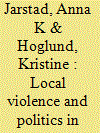

|
|
|
|
|
| Summary/Abstract |
This article analyses the narratives of survivors of violence in KwaZulu-Natal, South Africa, and addresses the relationship between local violence, politics and agency in a post-conflict setting. In particular, the study advances an understanding of how local political violence serves to increase or decrease agency. In line with previous research on emotions and agency, our study suggests that fear and anxiety encourage risk avoidance and have a pacifying effect on survivors of violence. It also indicates that anger and enthusiasm are emotions experienced by those who have a strong sense of agency and have become politically mobilised after violence. The study contributes to the debate on local capacity for peacebuilding and democracy by showing how local agency is affected by violence and how survivors of violence can become agents of change through politics.
|
|
|
|
|
|
|
|
|
|
|
|
|
|
|
|
| 4 |
ID:
088485
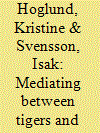

|
|
|
|
|
| Publication |
2009.
|
| Summary/Abstract |
Sri Lanka has suffered from one of Asia's most intractable civil wars, and is remarkably resistant to resolution. The peace process was initiated with a ceasefire between the separatist Liberation Tigers of Tamil Eelam and the Sri Lankan Government in 2002. This article explores the implications of the Norwegian mediation on this process. We argue that Norway's aspiration to promote an image of being a global peacemaker and the consent from regional and global powers are important in explaining why Norway became involved. Moreover, the Norwegian mediation approach - based on impartiality, ownership by the two main parties, and internationalization - has had consequences for how the process has unfolded. For instance, it influenced the potential leverage of Norway and conceptions about bias. This article contributes to an understanding of how regional and global processes, as well as mediator characteristics and approaches, influence the dynamics of civil war termination.
|
|
|
|
|
|
|
|
|
|
|
|
|
|
|
|
| 5 |
ID:
103222
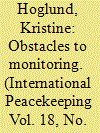

|
|
|
|
|
| Publication |
2011.
|
| Summary/Abstract |
This article addresses the ways in which linking a civilian monitoring mission with a mediator influences the work of that mission. It analyses how the Sri Lanka Monitoring Mission (SLMM) - deployed in order to oversee the results of the 2002 ceasefire agreement (CFA) - was influenced by Norway's dual role as a monitor and mediator. Did the dual role conflict with or strengthen the SLMM's work? This question is explored from the point of view of the monitors who served in the SLMM, based on new and unique empirical material from a survey and in-depth interviews with SLMM personnel. It highlights the confusion of roles between the monitors and the facilitators, which impeded the fulfilment of the monitors' task. The article also suggests avenues for future research relating to the development of third-party media strategies as well as considerations about the organizational arrangements both within and between third parties.
|
|
|
|
|
|
|
|
|
|
|
|
|
|
|
|
| 6 |
ID:
081921
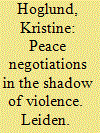

|
|
|
|
|
| Publication |
Leiden, Martinus Nijhoff Publishers, 2008.
|
| Description |
xiii, 210p.
|
| Series |
International negotiation series
|
| Standard Number |
9789004158375
|
|
|
|
|
|
|
|
|
|
|
|
Copies: C:1/I:0,R:0,Q:0
Circulation
| Accession# | Call# | Current Location | Status | Policy | Location |
| 053557 | 303.69/HOG 053557 | Main | On Shelf | General | |
|
|
|
|
| 7 |
ID:
055731
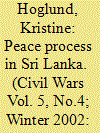

|
|
|
| 8 |
ID:
082017
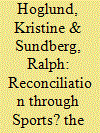

|
|
|
|
|
| Publication |
2008.
|
| Summary/Abstract |
Can sports-and if so how-serve as a vehicle for reconciliation and increased social cohesion in countries wrecked by civil conflict? This article analyses the case of South Africa and its experiences in the sports sector since the fall of apartheid, in an effort to explore the processes necessary to understand the potential sports may hold for peace building. By identifying initiatives in South Africa employed at the national, community and individual level of analysis, the article outlines the possible effects of sports on reconciliation in divided states. Through linking experiences from state policies, ngo activities and donor projects with social identity and reconciliation theory, the article outlines the possible positive and negative aspects of sports. Finally, important avenues for further research to uncover how to turn sports into effective political tools for post-conflict peace building are suggested
|
|
|
|
|
|
|
|
|
|
|
|
|
|
|
|
| 9 |
ID:
105956
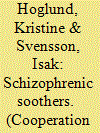

|
|
|
|
|
| Publication |
2011.
|
| Summary/Abstract |
How can the international community influence belligerents in internal armed conflict to move towards peace? Research on influence strategies in international relations commonly stresses the importance of a combined 'carrot-and-sticks' approach, yet little is known about how this mixed strategy is best applied in the context of internal armed conflict. The article addresses this question by developing a theoretical framework exploring the conditions under which the mixed approach is successful in influencing conflict actors and by focusing specifically on non-state actors. It is argued that the effectiveness of the contrast strategy in dealing with non-state actors depends on the balance between the 'good cop' approach and the 'bad cop' approach, the perceptions of the targets and contextual adoption of the sequencing of strategies. We apply this framework to the case of the Liberation Tigers of Tamil Eelam (LTTE) in Sri Lanka between 2002 and 2008, when the international community's initial success later turned into a failed attempt to influence the LTTE in the direction of respect for human rights, in ending the violation of the ceasefire and in preventing a return to the battlefield.
|
|
|
|
|
|
|
|
|
|
|
|
|
|
|
|
| 10 |
ID:
067759
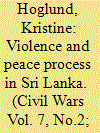

|
|
|
| 11 |
ID:
059693
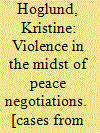

|
|
|
|
|
| Publication |
Sweden, Department of peace and conflict research, 2004.
|
| Description |
xi, 232p.
|
| Series |
Department of Peace and Conflict Research report;69
|
| Standard Number |
915061780X
|
|
|
|
|
|
|
|
|
|
|
|
Copies: C:1/I:0,R:0,Q:0
Circulation
| Accession# | Call# | Current Location | Status | Policy | Location |
| 049222 | 303.6/HOG 049222 | Main | On Shelf | General | |
|
|
|
|
| 12 |
ID:
049321
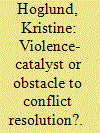

|
|
|
|
|
| Publication |
Uppsala, Department of peace and conflict research, 2001.
|
| Description |
21p.
|
| Series |
Uppsala peace research paper; no.3
|
| Standard Number |
9150615300
|
|
|
|
|
|
|
|
|
|
|
|
Copies: C:1/I:0,R:0,Q:0
Circulation
| Accession# | Call# | Current Location | Status | Policy | Location |
| 045201 | 303.6/HOG 045201 | Main | On Shelf | General | |
|
|
|
|
| 13 |
ID:
142610
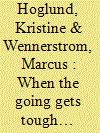

|
|
|
|
|
| Summary/Abstract |
This article analyzes how the conflict environment in which a civilian monitoring mission is deployed influences the monitors' assessment of the operation. It draws on unique empirical material from the experience of the Sri Lanka Monitoring Mission (SLMM), deployed to oversee a ceasefire agreement in Sri Lanka 2002–2008. With material from a survey and in-depth interviews, experiences of the monitors are analyzed and changes over time are traced in relation to the monitors' assessment of the mandate and organizational set-up of the mission. The study points to the difficulty of monitoring missions to address escalation during an ongoing peace process. Its function is dependent on the goodwill of the parties. In essence, monitoring missions have the potential to strengthen peace when there is momentum in favor of progress, but when relations between the parties turn sour and the conflict escalates a civilian monitoring mission basically loses its potential. During the final stages of the war, which saw a very large number of civilian casualties, the war-torn areas were closed to international observers. Moreover, international pressure for a short-term ceasefire to alleviate the humanitarian situation was dismissed by the Sri Lankan government, which also saw the backing of several important actors, not the least China.
|
|
|
|
|
|
|
|
|
|
|
|
|
|
|
|
|
|
|
|
|